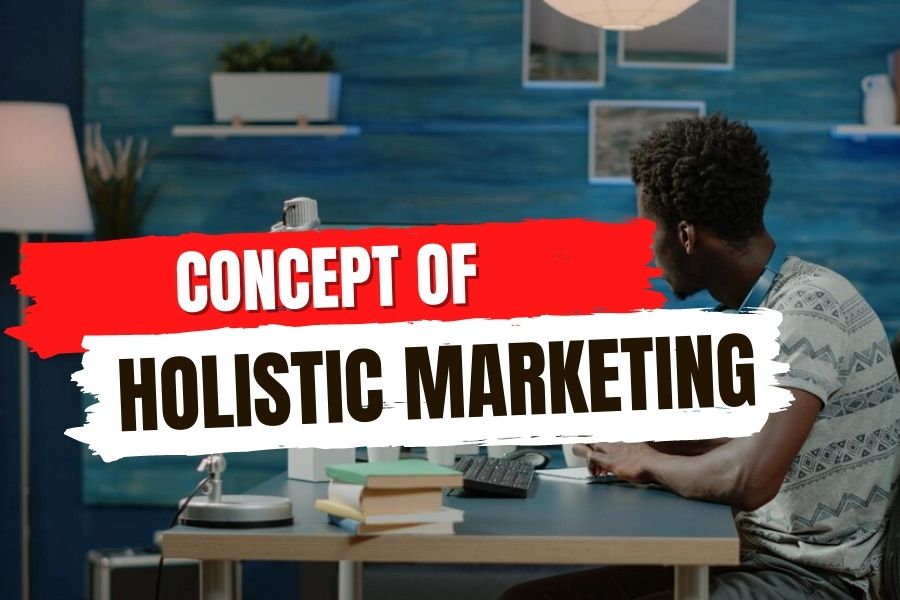Understanding the Concept of Holistic Marketing for Uplifting Brands


Concept of Holistic Marketing
Holistic marketing is the idea that all aspects of marketing achieve a common marketing strategy and provide flawless customer experiences. Just on the data front, this implies that all types of information in multiple formats and regions should be merged and harmonized in order to generate a consolidated perspective of sales performance. From a personal perspective, it entails making the correct information available to the whole advertising organization – including media groups, online marketers, brand marketing companies, analytics, consumer insights, commerce, and the CMO (or Chief Growth Officer). When all groups are presenting on the same objectives, their progress must be able to flow via a uniform, expandable reporting system.
In today’s modern multichannel society, holistic marketing is critical. And how does it actually appear in practice? The examples below show how to apply holistic marketing in your firm in order to connect your information and humans.
Table of Contents
Definition of Holistic Marketing
According to Philip Kotler and Kevin Lane Keller, the theory of holistic marketing is as regards:
“A holistic marketing concept is focused on the creation, implementation, and effectiveness of marketing programs, procedures, and operations that understand the scope and interdependence of branding strategies, operations, and events.” Holistic marketing acknowledges that ‘everything matters’ in advertising and that a broader, comprehensive approach is required to achieve the optimum answer.”
Holistic marketing is all about businesses examining the complete organization. The corporation must examine every part of the business while implementing a holistic marketing plan. The corporation needs to examine consumer engagement with its products, web, promotional material, and anything else. Holistic marketing refers to a technique that allows a firm’s marketing efforts to be viewed as a ‘total,’ hence assisting in the development of a comprehensive or ‘holistic marketing’ policy.
The Main Components of Holistic Marketing
Today’s modern companies need to make sure that any judgments they make do not conflict with those of any other division inside the company. Once the resources of the entire organization are directed more towards a shared goal can firms expect to thrive in today’s ultra economy?
The four aspects of holistic marketing are as follows:
- Relationship marketing
- Integrated marketing
- Internal marketing
- and Societal marketing
Lets now discuss them in detail one by one:
Relationship Marketing
Relationship marketing is a method that focuses on developing strong relationships with customers and is mostly built on communicating directly, customer engagement, and customer support.
Subscription services (SaaS companies) and other businesses that charge users on a routine basis gain from a strong emphasis on relationship marketing. Upselling and retaining the right people who already use your goods and services is quicker than customer acquisition.
The advantages of relationship marketing apply if your organization does not invoice clients on a daily basis. Businesses that sell products and services while also employing relationship marketing tactics typically achieve the desired results: WOM (Word of Mouth), often referred to as FREE marketing.
Integrated Marketing
Integrated marketing is built on the principle that rather than choosing on discrete marketing initiatives, advertisers should construct an integrated marketing system with the aim of creating, communicating, and delivering benefits to clients.
The goal of integrated marketing is to generate harmony from all marketing operations, which is only feasible with an inclusive process. It is essentially about formulating an efficient integrated marketing mix. Businesses need to formulate effective plans to generate synergies.
Internal Marketing
Internal marketing relies on the principle that staff is an organization’s corporate clients, and their satisfaction is critical in a way to attain the aim of client satisfaction. This marketing enables the development of professional and self-motivated staff, and also that every employee of the organization fully knows the company’s business strategy and overall customer philosophy.
Internal marketing is also concerned with ensuring unity and synergy across the institution’s many marketing processes and tasks. The marketing team has to avoid the disputes as it can adversely affect the external marketing campaigns.
Societal Marketing/Socially Responsible Marketing
The term “Socially Responsible Marketing” refers to advertising that highlights ethical responsibilities. This approach necessitates that a corporation supports prosperity both for its consumers and society. Socially responsible marketing attempts to combine brands with a meaningful purpose. They maintain clear expectations while promoting societal change.
Many individuals refer to socially responsible marketing in a variety of ways. This includes humanistic marketing, environmental marketing, green marketing, corporate social marketing, and cause-related marketing. Marketers must not engage in unethical activity that can harm people and society as a whole. The increasing influence of societal marketing may be seen in the bigger pieces of evidence of corporate social responsibility actions conducted by most businesses these days.
The Importance of Implementing Holistic Marketing
Businesses whether small or large can effectively grow their business by leveraging the power of holistic marketing. The key benefits of using holistic marketing are:
- A comprehensive plan efficiently communicates the brand message by fostering harmony. It is concerned with the wider picture. It offers consumers a distinct brand impression that they will recognize.
- Once you handle the company areas collectively, it becomes simpler to remove or minimize duplication. The company helps save money while becoming more productive. Detecting potential risks and taking advantage of opportunities is also a component of efficiency.
- Consistency is essential for the long market survival. The business partners must promote to all partners in a comprehensive approach. Companies also maintain consistency by employing integrated communication techniques. This aids in maintaining uniformity.
- There is a change in customer attitudes. They purchase a brand rather than a single product. Holistic marketing allows a company to build a brand among all of its constituents.
- It enables the customer to emphasize the company’s core values, boosting the company’s capabilities to function.
Conclusion
Holistic marketing is an approach that keeps growing greatly in the near future. It will supply you with numerous positive aspects.
Recognizing the customer’s deep thinking is more important than before right now. Nobody knows what they want, yet they realize it’s something they desire. You can make a long-lasting impact and connection with your customers if your company stands out in a time. So, Don’t put it off; make things work now.






